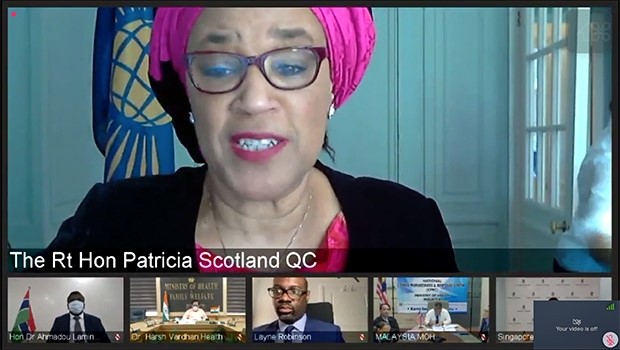Commonwealth health ministers have agreed to coordinate their response in tackling the coronavirus pandemic.
Ministers endorsed removing fees for coronavirus tests and treatment, especially for migrants and refugees, as appropriate within national contexts, and creating a voluntary mechanism to share and distribute extra medical supplies including ventilators and testing kits.
They agreed on the need for solidarity and cooperation among Commonwealth countries and that close working with the World Health Organization throughout the crisis was vital.
This statement was released following the annual Commonwealth Health Ministers Meeting held on 14 May.
Commonwealth Secretary-General Patricia Scotland said: “We are now participants at an inflection point in history, and how we will be seen will be determined by how we act, right now, in this moment.
“The virus knows no nationality, race, religion, border or economic status. It is an interconnected issue threatening our global health and world economic order, and should be dealt with as such – guided by a culture of multilateral compassion and cooperation – not competition.
“At this critical moment, invigorated by our common pain and concern, Commonwealth countries have come together to provide the salve we need to deliver a coordinated multilateral response that will help thwart the pandemic and keep our citizens safe.”
Globally, around 4.7 million coronavirus cases have been reported. Half a million of these are in the Commonwealth. Seven member states are among 12 nations worldwide that have not reported any cases.
The fast-spreading virus has contracted economies, shattered income streams and forced millions of people to stay indoors.
Health ministers backed the need for unified action to recover from the economic turmoil accompanying the pandemic, while addressing critical health challenges and health systems’ vulnerability, particularly to recurring climate-related events.

The World Health Organization’s Director-General Tedros Adhanom Ghebreyesus said: “While coronavirus is an unprecedented shock to the world; through national unity and global solidarity, we can save both lives and livelihoods.
“Across the Commonwealth, countries will need to balance the demands of responding directly to coronavirus, while also maintaining essential health services.”
Ministers pledged to keep essential health services running for non-COVID-19 patients with a critical non-communicable or infectious disease while dealing with an influx of coronavirus cases.
They agreed to work with finance ministers to promote sustainable strategies to finance the implementation of universal health coverage with a focus on providing health care to women, the elderly, young people, marginalised persons and those with mental illness without facing financial difficulty.
The Gambia’s health minister Ahmadou Lamin Samateh chaired the meeting.
He said: “Not since the HIV/AIDS epidemic in the 2000s has health occupied such a central position in development policy.
“With an unprecedented pandemic, straining health systems and halting the global economy, the role of resilient health systems across the world has come into full focus.”
During the meeting, ministers presented effective national strategies to address the pandemic, which included a mass test, trace and isolate strategy, digital tools to monitor health status and track transmission routes and a clear communication line.
India is in line to chair the next Commonwealth Health Ministers Meeting in 2021.


























